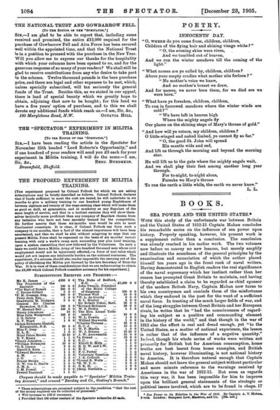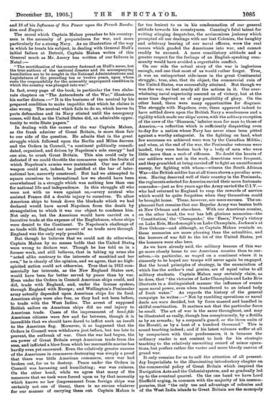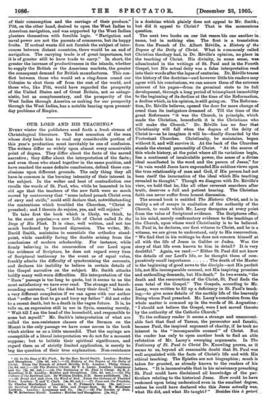WITH this study of the unfortunate war between Britain and
the United States of 1812.15 Captain Mahan concludes his remarkable series on the influence of sea power upon history. Properly speaking, however, his present work is a supplement rather than a conclusion. The conclusion was already reached in his earlier work. The two volumes now before us convey no new lessons, but merely amplify and illustrate the soundness of the general principles by the examination and enunciation of which the author placed himself ten years ago in the front rank of naval writers. Having demonstrated to English readers the real significance of the naval supremacy which her instinct rather than her reason has prompted Great Britain to maintain, and having thereby established a claim to be regarded as chief sponsor of the modern British Navy, Captain Mahan now turns to his own countrymen and reminds them of the misfortunes which they endured in the past for the want of a sufficient naval force. In treating of the much larger fields of war, and of the long struggles between Great Britain and her European rivals, he writes that he " had the consciousness of regard- ing his subject as a positive and commanding element in the history of the world," and that though in the war of 1812 also the effect is real and dread enough, yet "to the United States, as a matter of national experience, the lesson is rather that of the influence of a negative quantity." Indeed, though his whole series of works were written not primarily for British but for American consumption, home truths are best learnt from home examples, and British naval history, however illuminating, is not national history to America. It is therefore natural enough that Captain Mahan should not leave the general subject without particular and more minute reference to the warnings received by Americans in the war of 1812-15. But even as regards this very war, it has been impossible for him to improve upon the brilliant general statements of the strategic or political issues involved, which are to be found in chaps. 17 • Sea Power in its Relation to the War of 1812. By Captain A. T. Mahan., 2 vols. London: Sampson Low, Marston, and Co. [Ws. net.]
The moral which Captain Mahan preaches to his country- men is the necessity of preparedness for war, and more particularly for a strong Navy. As an illustration of the way in which he treats his subject, in dealing with General Hull's initial failure at Detroit, Captain Mahan writes of this General much as Mr. Amery has written of our failures in Natal :—
" The mortification of the country fastened on Hull's name, but the true authors of the national disaster and its accompanying humiliation are to be sought in the National Administrations and Legislatures of the preceding ten or twelve years, upon whom rests the responsibility for the miserably unprepared condition in which the country was plunged into war."
In fact, every page of the book, in particular the two elabo- rate chapters on " The Antecedents of the War," illustrates his earlier dictum :—" It is the business of the neutral by his prepared condition to make impolitic that which he claims is also wrong. The neutral which fails to do so, which leaves its ports defenceless and its Navy stinted until the emergency comes, will find, as the United States did, an admirable oppor_ tunity to write State papers."
In dealing with the causes of the war Captain Mahan, as the frank admirer of Great Britain, is more than fair to our side of the question. He admits that in the great struggle which followed upon the Berlin and Milan decrees and the Orders in Council, "a continent politically consoli- dated, organised, and driven by Napoleon's sole energy" had one aim, to crush Great Britain. This aim could only be defeated if we could throttle the commerce upon the fruits of which Napoleon's armies were maintained. Our use of this weapon could not, indeed, be justified at the bar of inter- national law, narrowly construed. But had we attempted to square ourselves to international law we should have been overwhelmed in a struggle which was nothing less than one for national life and independence. In this struggle all who were not with us were against us,—every neutral who assisted France did a double injury to ourselves. To allow American ships to break down the blockade which we had declared would have saved Napoleon from the death by strangulation to which it was our object to condemn him.
Not only so, but the American would have carried on a lucrative trade at the expense of the Englishman, whose ships
were denied to the Continent. To Napoleon's challenge of no trade with England our answer of no trade save through England was the only reply possible.
But though he believes that we could not do otherwise,
Captain Mahan by no means holds that the United States were wrong to declare war. Though he has told us in a
former work, and still believes, that in taking up arms she " acted alike contrary to the interests of mankind and her own," he is clearly of the opinion, and we agree, that no high- spirited nation could act otherwise. True that in 1812 com- mercially her interests, as the New England States saw, would have been far better served by peace than by war.
Even under the Orders in Council American ships could, and did, trade with England, and, under the license system, through England with Europe ; and Wellington's Peninsular army actually depended upon American ships for its food.
American ships were also free, as they had not been before, to trade with the West Indies. The arrest of supposed British sailors on American ships did no real injury to American trade. Cases of the impressment of bond-fide American citizens were few and far between, though it is incredible that we should have dared to inflict such an insult to the American flag. Moreover, it so happened that the Orders in Council were withdrawn just before, but too late to prevent, the outbreak of war. Once the war had begun, the sea power of Great Britain swept American trade from the
seas, and inflicted a blow from which her mercantile marine has hardly even yet recovered. Even the relatively greater success
of the Americans in commerce-destroying was simply a proof that there was little American commerce, once war had
broken out, for us to destroy. Peace under the Orders in Council was harassing and humiliating; war was ruinous. On the other band, while we agree that many of the measures that we took were forced upon us by that necessity which knows no law (impressment from foreign ships was certainly not one of them), there is no excuse whatever for our manner of carrying them out. Captain Mahan is far too lenient to us in his condemnation of our general attitude towards his countrymen. Canning's fatal talent for writing stinging despatches, the acrimonious jealousy which prompted all our dealings with our lost Colonies, the haughty and arbitrary bearing of our naval officers, were the real causes which goaded the Americans into war, and cannot readily be excused. A more conciliatory attitude and a, greater respect for the feelings of an English-speaking com- munity would have avoided a regrettable conflict..
On our side the actual story of the war is inglorious enough, and one that most of us would rather forget. True, it was an unimportant side-issue in the great Continental struggle ; true, also, that its object, the commercial ruin of the United States, was successfully attained. But though we won the war, we lost nearly all the actions in it. Our over- whelming naval superiority assured us of victory, but at the same time deprived us of any possibility of glory. On the other band, there were many opportunities for disgrace. The struggle with Napoleon over, there appeared indeed to have settled down upon the British Navy a woodenness and a rigidity which made our ships' crews, with the solitary exception of the crew of the Shannon,' inferior man for man to, those of America,—a reflection which is sufficiently disquieting even to-day for a nation whose Navy has never since been pitted against a worthy antagonist. In the fighting on land, what few successes we achieved were won by the Canadian Militia ; and when, at the end of the war, the Peninsular veterans were landed, they were beaten back by a body of men who were little more than a mob of riflemen. No doubt the hearts of our soldiers were not in the work, desertions were frequent, and they grumbled at being carried off to fight an ununiformed enemy, for fighting with whom—witness the South African War—the British soldier has at all times shown a peculiar aver. sion. Having deserved well of their country in the Peninsula, the regiments selected for America envied their more fortunate comrades—just as five years ago the Army envied the C.I.V.- who had returned to England to reap the rewards of service which would be quite forgotten when they themselves could be brought home. These, however, are mere excuses. The un- pleasant fact remains that our Regular Army was beaten both at New Orleans and elsewhere. With our American cousins, on the other hand, the war has left glorious memories—the Constitution,' the Chesapeake,' the ' Essex,' Perry's victory on Lake Erie, Macdonough's on Lake Champlain, Jackson's at New Orleans—and although, as Captain Mahan reminds• us, these memories are more pleasing than the actualities, and the horrors of war fell to the lot of the United States, yet the honours were also hers.
As we have already said, the military lessons of this war go more closely home to our American cousins than to our- selves,—in particular, as waged on a continent where it is sincerely to be hoped our troops will never again be engaged. But the broad principles of strategy, in the enunciation of which lies the author's real genius, are of equal value to all military students. Captain Mahan may certainly claim, as be does, that " the victories of Lake Champlain and Lake Erie illustrate in a distinguished manner the influence of events upon naval power, even when transferred to an inland body of fresh water." As regards the history of the general campaign he writes :—" Not by rambling operations or naval duels are wars decided, but by force massed and handled in skilful combination. It matters not that the particular force be small. The art of war is the same throughout, and may be illustrated as really, though less conspicuously, by a flotilla as by an armada; by a corporal's guard, or the three units of the Horatii, as by a host of a hundred thousand." This is sound teaching indeed ; and if his latest volumes suffer at all by comparison with their predecessors, it is because the ordinary reader is not content to look for his strategic teaching to the relatively unexciting record of minor opera- tions, but prefers rather the vaster and more bloody canvas of grand war.
It only remains for us to call the attention of all present- day Imperialists to the illuminating introductory chapter on the commercial policy of Great Britain which inspired the Navigation Acts and the Colonial system, and so gradually led up to the eventual quarrel. On the one hand we have Lord Sheffield urging, in common with the majority of his contem- poraries, that " the only use and advantage of colonies and of the West India islands to Great Britain are the monopoly
of their consumption and the carriage of their produce." Pitt, on the other hand, desired to open the West Indies to American navigation, and was supported by the West Indian planters themselves with forcible logic. " Navigation and naval power are not the parents of commerce, but its happy fruits. If mutual wants did not furnish the subject of inter- course between distant countries, there would be an end of navigation. The carrying trade is of great importance, but it is of greater still to have trade to carry." In short, the greater the increase of productiveness in the islands, whether to supply the British or the American markets, the greater the consequent demand for British manufactures. This con- flict between those who would set a ring-fence round our Colonies to shut them off from the rest of the world, and those who, like Pitt, would have regarded the prosperity of the United States and of Great Britain, not as antago- nistic, but as complementary, and the prosperity of the West Indies through America as making for our prosperity through the West Indies, has a notable bearing upon present- day problems of Empire.








































 Previous page
Previous page